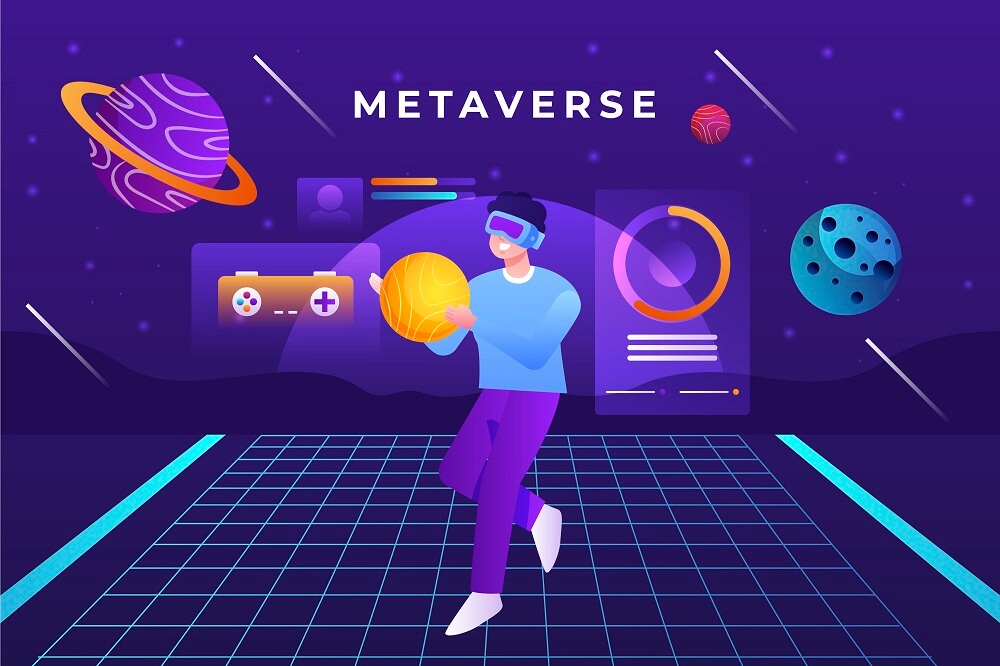The Metaverse, a term coined by Neal Stephenson in his 1992 science fiction novel “Snow Crash,” has long captured the imagination of technologists, futurists, and dreamers alike. It represents a collective virtual space where individuals can interact, create, work, and play in a shared digital environment. Over the years, the concept has evolved from science fiction fantasy to a tangible vision with the rapid advancement of technology. In this article, we will delve into the concept of the Metaverse, its evolution, its potential impact on various aspects of society, technological requirements, and ethical considerations.

Understanding the Metaverse
The Metaverse is envisioned as a vast, interconnected network of virtual worlds, seamlessly integrated into a singular digital realm. Users can navigate through this space using avatars, interacting with other users and digital entities, and engaging in various activities such as gaming, socializing, shopping, learning, and even working. Unlike traditional virtual reality environments, Metaverse is not confined to a single platform or application but rather encompasses a diverse array of interconnected virtual spaces, each with its own rules, economies, and cultures.
At its core, the Metaverse promises to revolutionize the way we perceive and interact with digital environments. It transcends the boundaries of physical reality, offering limitless possibilities for creativity, collaboration, and exploration. Whether it’s attending virtual concerts, exploring immersive educational simulations, or conducting business meetings in virtual boardrooms, Metaverse has the potential to redefine our daily lives in profound ways.
Impact on Social Interaction:
One of the most significant implications of the Metaverse is its impact on social interaction. In a world where physical proximity is no longer a barrier, individuals can connect with others from around the globe, forging meaningful relationships and communities in virtual space. From casual encounters in virtual cafes to large-scale social events and gatherings, Metaverse provides a platform for people to come together, regardless of geographical distance or physical limitations.
Furthermore, the immersive nature of the Metaverse allows for deeper, more meaningful interactions than traditional forms of online communication. Avatars convey subtle cues and expressions, fostering a sense of presence and empathy that transcends text-based communication. This enhanced social presence has the potential to strengthen bonds between individuals and facilitate more authentic connections in the digital realm.

Impact on Entertainment:
Entertainment is another area poised to be transformed by the Metaverse. Already, we are seeing the emergence of virtual reality experiences that blur the line between reality and fiction, offering users immersive storytelling experiences unlike anything seen before. From virtual concerts and live events to interactive gaming experiences and immersive theater productions, the Metaverse offers a wealth of entertainment options for users to explore.
Moreover, the decentralized nature of the Metaverse enables content creators to reach audiences directly, bypassing traditional gatekeepers and intermediaries. This democratization of content creation empowers artists, musicians, filmmakers, and game developers to share their creations with the world, unleashing a wave of creativity and innovation in the digital realm.
Impact on Work:
The Metaverse also holds the potential to revolutionize the way we work and collaborate. With the rise of remote work and distributed teams, virtual collaboration tools have become increasingly important in facilitating communication and collaboration across distance. The Metaverse takes this concept to the next level, offering virtual workspaces where colleagues can meet, brainstorm ideas, and collaborate on projects in real time.
Virtual meetings and conferences become more immersive and engaging, with participants able to interact with each other and share content in a shared virtual environment. Moreover, the Metaverse opens up new possibilities for remote work, allowing individuals to work from anywhere in the world while still feeling connected to their colleagues and peers.

Technological Advancements:
Realizing the full potential of the Metaverse requires significant advancements in various fields of technology. First and foremost is the development of immersive virtual reality hardware capable of delivering high-quality, low-latency experiences. This includes advancements in display technology, motion tracking, haptic feedback, and spatial audio to create more realistic and immersive virtual environments.
Additionally, the infrastructure supporting the Metaverse must be robust, scalable, and decentralized to accommodate the vast number of users and interactions within the virtual space. This includes advancements in cloud computing, networking, and distributed ledger technology to ensure seamless connectivity and data interoperability across virtual worlds.
Furthermore, advances in artificial intelligence and natural language processing will play a crucial role in creating more lifelike avatars and intelligent virtual assistants that can enhance the user experience and facilitate natural interactions within the Metaverse.
Societal Impacts and Ethical Considerations:
While the Metaverse holds great promise, it also raises important societal and ethical considerations that must be addressed. One of the primary concerns is privacy and data security, as the Metaverse collects vast amounts of personal data about users’ behaviors, preferences, and interactions. There is a risk of data breaches, surveillance, and exploitation if proper safeguards are not put in place to protect users’ privacy rights.
Accessibility is another key issue, as the Metaverse must be inclusive and accessible to individuals of all abilities. This includes designing virtual environments and interfaces that accommodate diverse needs and preferences, such as providing alternative navigation options for users with mobility impairments or offering text-to-speech functionality for users with visual impairments.
Moreover, the Metaverse has the potential to exacerbate existing social inequalities if access to virtual resources and opportunities is not distributed equitably. It is essential to ensure that marginalized communities have equal access to the benefits of the Metaverse and that efforts are made to address digital divides and disparities in access to technology.
Conclusion:
The Metaverse represents a bold vision for the future of virtual worlds, offering a vast, interconnected network of digital spaces where individuals can live, work, and play in ways never before possible. With its potential to revolutionize social interaction, entertainment, and work, the Metaverse holds great promise for shaping the future of human experience in the digital age.
However, realizing this vision will require significant technological advancements, careful consideration of societal impacts, and proactive efforts to address ethical considerations such as privacy, accessibility, and social equity. By working together to overcome these challenges, we can unlock the full potential of the Metaverse and create a more inclusive, immersive, and interconnected digital future for all.



